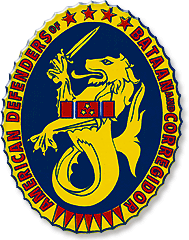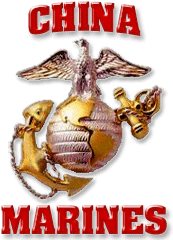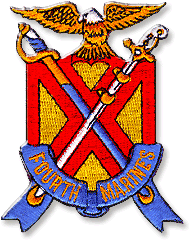|
CHAPTER TWO -
The “Clouds of War”
Marines had been stationed in the International
Settlement for 14 years but in late November of 1941, as the threat of
an armed conflict with Japan escalated (in the several years prior to
the advent of World War II), the United States finally ordered the
withdrawal of all it’s armed forces from China. It was reluctant to do
so, perhaps because the Marines, one cruiser, a few over age destroyers
and some river patrols boats were about the last bit of protection for
Americans and U.S. interests there.
It was a sad day in the famed International Settlement when the last of
the 4th Marines left Shanghai on November 28th, 1941. Other nations had
already removed their troops, a few at a time, and now the Marines were
the last to depart. The Japanese then occupied virtually all of the
northeastern part of China. With the Marines gone, millions of people
in Shanghai, many of them refugees from the surrounding war zones,
would be at their mercy. The significance of their departure was well
understood that memorable day.
Leading the Marines down East Nanking Road toward the muddy Whangpoo
River, where ships lay at anchor to evacuate them, was the last China
band, led by Master Technical Sergeant Levis E. Giffin. It was a
combination of the Peking ( now called Beijing) Legation Guard Band,
one that had been stationed there until early 1941, and the Shanghai
band of the 4th Marines since 1927. Joining them were the Field
Musicians from the infantry battalions; the buglers and drummers that
always became part of the band on parade.
It was larger than most post bands of the past,
almost 50 members. Among those fine musicians, many that had played
together for many years, was a small, skinny, redheaded, freckled farm
boy more recently from the plains of Nebraska. Marching along carrying
a new shiny brass French horn playing “The Marines Hymn” and “Sempre
Fidelis” March for the last time. It was a sad day for him, too. I
know, for I was that horn player.
A curtain of low clouds threatening rain hung over the city and
thousands of people were crowding the street below. It was decorated
with all sorts of red and gold banners emblazoned with large Chinese
characters. Flags and streamers dangled and flapped from poles and
wires strung between the buildings. Some may have read, “Good Bye and
Good Luck”. We wouldn’t have known. Most were just the usual very
colorful “CHEAP SALE” banners that were there on a daily basis.
Even so they helped brighten the very dull gray day that it was. Still,
it was a better one than the day before when, in a downpour, the Second
Battalion rode to the Bund in big green, double decker, English style
buses. They had embarked on the SS President Madison wearing rain
slicked ponchos, and so did not get the big farewell send off with all
the sound and parting hoopla which we were seeing.
During the march some spectators would occasionally break out of the
crowd and run up to Drum Major Jackson P. Rauhof and shove a wrapped
gift under his arm. Some most curiously shaped like a bottle. After a
while he had so many packages that he could hardly handle his baton. He
passed some off to front rank trombone players behind him who stuck
them in their blouses. They looked a bit like busty ladies. Others
brought more to those behind us, not all were something to drink. There
were fruit baskets, cakes and some valuable gifts. Even fine silver and
cloisonne. The outside columns of green clad Marines following the band
were blessed. As we marched along I searched the crowds on either side
looking for people I might know, especially girls. I thought some might
have come to wave goodbye; the Solomon sisters, Tamara, the Russian
girl that I liked pretty well. I looked for at least a glimpse of Miss
Andrews, a young British girl who often hosted social events at the
Navy YMCA. I had a secret crush on her but always had been too shy to
press it.
I didn’t hope to see the pretty face of my friend, the beautiful Lei Na
Liew. I was certain she wouldn’t be there. We had said our goodbyes at
the roller rink the night before and I sensed then it was for the last
time. Maybe I hoped I would be wrong. While I liked girls, lots of
them, I didn’t expect any to come and see me off. If any were there, I
missed seeing them. Finding friends among such a large crowd of people,
while trying to read the music as I marched along, was nearly hopeless.
Some of the women were crying and wailing over the departure of their
men, grieving the loss of their meal tickets and someone to pay the
rent. There were landlords and barkeeps among the crowd too, waving
unpaid “chits” at the marching men. Men who were caught short and
unable to settle their affairs before leaving on such short notice.
Leaving my friends behind was nothing compared to the sorrow of parting
among some of the other band members. Nothing sweet about it. Clarinet
player, Corporal Kenneth Marshall had to leave his young, pretty wife.
They had just rejoined only a short time before, so it was the second
time they had to part and found it harder this time for now there was a
tiny daughter. They had just started to know one another. Out of the
corner of my eye, I glanced at the old Sergeant John Bingham, my french
horn section leader marching beside me. A veteran China hand. He had
served a number of tours there, living with the same Chinese woman
during most of them. Perhaps parting was something they were used to.
He had left her in times gone by and always came back but when she
waved a good bye to him now it was for the last time ever, for he would
perish on one of the enemy’s hell ships during the last year of the war.
Trumpeter Francis Hooker, “F C PFC” we called him, was leaving his
wife, an Eurasian beauty. They were about the happiest couple I knew
only a few days before. The last happy days they would ever share. I
would take his standby watches for him so he could go home to her on
his duty nights. He paid me to do it, which was a common custom in
those days. Clarinet player Corporal Claude Brent, fastidious and
friendly, fellow member of our YMCA camera club, had lived with the
daughter of a white Russian refugee for a very long time. They were all
but married. Living together with a resident lady was not at all
uncommon on Asiatic stations for many Marines and Sailors.
Reaching the Bund, Shanghai’s water front at the edge of the Whangpoo
River, we loaded onto flat bottomed shallow draft tender barges that
took us out to the American President Lines Ship, SS Harrison anchored
in deeper water off shore. We stopped playing then and listened to a
jazz band from one of the favorite cabaret haunts in the “Paris of the
Orient”, play us off from the back of a truck. It’s leader, Buck
Clayton later became an internationally known Jazz “great”. His band
was very popular there and the Marines were very pleased that this
group had come to say goodbye.
Once on board the ship the sun broke through great gaps in the gray sky
and shot massive beams down on the city like there were huge
searchlights hidden above the clouds. They illuminated large patches of
the great city we were leaving in great brilliant splashes. A dramatic
scene for such a climactic departure.
The crew had hastily rigged the ship to accommodate what must have
seemed to them about half of the U. S. Marine Corps. As quickly as it
was loaded it sailed down the river, past the big city power plant with
it’s towering chimney, toward the great reddish Yangtse river at
Woosung toward the East China Sea. Many Marines aboard had stood guard
on the big electric station and climbed to the top of it’s big stack to
watch river traffic. There would be much harder climbs ahead for them.
As the City’s famous water front skyline receded from view, only the
tall smoke stack marked what had been our once happy “home”. It was an
end of an era. Marines would again return to China in a few years, but
this was the finale of one of the most adventurous duty stations in
Marine Corps history.
Suddenly a great shadow of a large ship passed by on the port side
going upstream. I looked up from assembling a canvas folding cot to see
a huge Japanese cruiser. Moving about on the warship’s decks underneath
massive guns, were chubby little men in funny looking, ill fitting blue
sailor suits. The gold chrysanthemum blossom emblem on her bow head led
their ship past ours so close they almost touched. Parting, sterns
away, the Stars and Stripes flapped smartly our good bye. The Japanese
flag of red rays radiating outward from its rising sun waved back
arrogantly off the big cruisers fantail. Did Japan have other warships
as powerful and formidable looking as the one that just passed? I had
no inkling at all that Japan had such powerful forces. All at once our
ocean liner seemed very small and fragile. After that sight it was a
nervous and not very pleasant voyage to the Philippines.
Early the first morning at sea a few submarines came to the surface.
PFC Jules Balcer and I were taking pictures of them and, after we
determined they were American boats, we felt more at ease. At least the
ship had some protection besides the two old river patrol boats, the
USS Luzon and the USS Oahu. It had been a Brave and nervy mission to
board up the sides of those flat bottomed crafts and take them out into
the open sea. They looked like the “Sandpebbles” in a movie about the
Yangtze River Patrol. These gunboats had been guarding American
interests and property from the sea to the Ichang gorges for years.
One, the USS Panay had been sunk by a Japanese warplane in 1937. A
mistake, “Go mm na sal”, they said, “So Sow ri!”. Not many ever
believed that. The faster ship overtook the gunboats, leaving them
behind, for the Harrison was in a hurry to reach the Philippines,
unload and return to get the Marines left in north China. It never made
it. The ship and all the troops left behind were captured the day war
with the Japanese began.
It was crowded below decks, so most of the bandsman slept on the
forecastle, going below only to eat the plentiful amounts of very
excellent food the ships cooks fixed: steaks, mashed potatoes and
gravy, and canned fruits. Thoughts of it would come to mind, over and
over again when we were nearly starving, a few months later. After
reaching the U.S. Naval Station at Olongapo, Philippine Islands,
leaving the great chow aboard ship was the only regret. It was the 2nd
day of December 1941, only 4 days away from the beginning of the war
with Japan.
|





